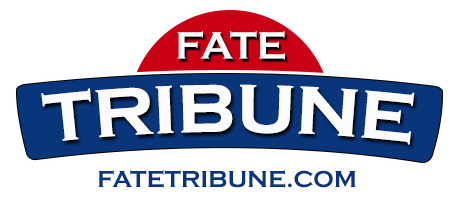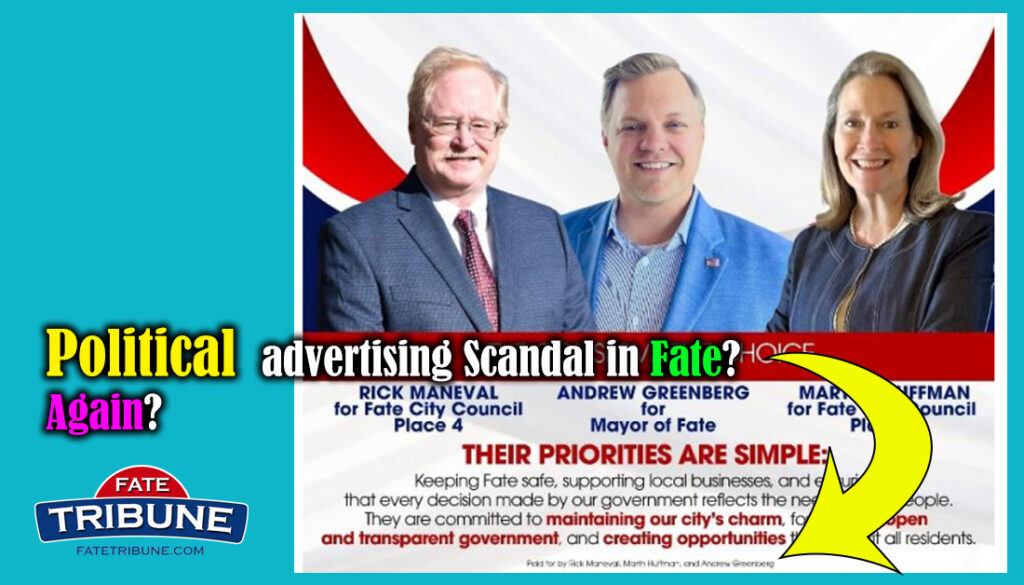FATE, TX — A complaint filed with the Texas Ethics Commission (TEC) on April 24, 2025, by local activist Autumn Lobinsky has cast a shadow over the campaigns of three Fate candidates: Andrew Greenberg (Mayor), Rick Maneval (Place 4), and Martha Huffman (Place 6). Lobinsky, a vocal liberal known for her prolific social media presence, alleges that the trio violated Texas election law by omitting required disclosures on campaign signs and flyers. The accusations raise questions about selective enforcement and the weaponization of bureaucratic technicalities in local races.
According to email received by the Fate Tribune from Lobinsky, she alleges that the candidates failed to include the mandatory “Political Advertising” or “Pol. Adv.” disclaimer on their campaign signs, as required by Texas Election Code, Title 15, Chapter 255, Section 001(a)(1). The law mandates that all political advertising clearly state “Political Advertising” followed by the name of the person or entity who paid for it. While the candidates’ signs do include “Paid for by [Candidate’s Name],” each of them omits the critical “Political Advertising” phrase. Lobinsky claims the violations began in March 2025 for Greenberg and extended to joint signage with Maneval and Huffman in April.
Lobinsky further alleges that door hangers and flyers distributed by the trio lack the same disclosure. However, Section 255.001(d) exempts flyers costing less than $500 in aggregate to publish and distribute. Campaign finance disclosures show Huffman spent $351.86 and Maneval $195.82 on flyers, well below the threshold. Greenberg’s filings report no flyer expenses, possibly due to billing timing. Thus, the flyer complaint may be a nonstarter, as the candidates voluntarily included “Paid for by” statements despite no legal obligation to do so.
The complaint’s selective nature raises eyebrows. Lobinsky, who opposes the three candidates, spared George Lewis, also a Place 4 candidate running against Rick Maneval & Emily Camacho . Lewis’s signs entirely lack any of the required “Political Advertising” and “Paid for by” statements, yet Lobinsky claims she hasn’t seen his signs and notes he reported no sign-related expenditures on his campaign finance reports.
In an interview with a person familiar with the matter, the Fate Tribune learned that most political signs across Rockwall County omit the phrase “Political Advertising,” as candidates and voters alike consider it presumptive that a sign bearing a candidate’s name and the office sought is plainly an “advertisement”. The source emphasized that the phrase’s primary purpose, as mandated by the Texas Election Code, is to prevent Political Action Committees (PACs) from obscuring their motivations or biases behind vague or misleading signage. This widespread omission, the source noted, reflects a practical understanding of the law’s intent, though it leaves candidates vulnerable to complaints like the one filed by Autumn Lobinsky against Greenberg, Maneval, and Huffman.
This isn’t Fate’s first brush with campaign sign controversies. Last year, the Fate Tribune reported on a similar issue involving candidate Cinnamon Krauss, whose signs listed the wrong entity as the payer of the signs. While it could be argued that the Krauss situation was magnitudes of order more deceptive, the outcome of that situation was resolved with a Sharpie, as the candidate simply corrected the signs by hand. No fines or reprimands were paid by the campaign in that situation.
The TEC has five working days to review Lobinsky’s complaint, meaning a decision could come by May 1. Possible outcomes include dismissing the case, requiring a “good faith effort” to correct the signs (such as adding “Political Advertising” by hand), or taking no action. Even if corrective measures are ordered, candidates would have 10 days to comply—pushing resolution well past the election, when signs are likely to be removed regardless. Given this timing, the odds are favored that TEC may well toss the complaint as moot.
The Fate Tribune was unable to get a response from the candidates. Under TEC rules, Greenberg, Maneval, and Huffman are barred from commenting until the case is resolved. Lobinsky, however, faces no such restriction and has taken to social media and the Fate Tribune to amplify her allegations. Her willingness to exploit this asymmetry underscores the complaint’s political motivations.
For constitutional conservatives, this saga is a reminder of the left’s penchant for weaponizing bureaucratic minutiae to silence opponents. Texas election law exists to ensure transparency, not to serve as a cudgel for partisan vendettas. The voters of Fate deserve campaigns focused on ideas—property taxes, infrastructure, liberty—not distractions over signage technicalities. As the TEC deliberates, one thing is clear: Lobinsky’s complaint may generate headlines and clicks, but it’s unlikely to alter the trajectory of this election.

